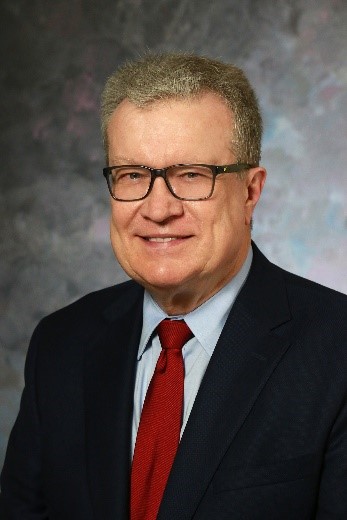【百家大讲堂】第311期:研究太阳粒子的立方星任务
讲座题目:研究太阳粒子的立方星任务
报 告 人:WALTER D. DOWNING
时 间:2020年1月10日(周五)15:00-18:00
地 点:中关村校区信息实验楼205会议室
主办单位:研究生院、信息与电子学院
报名方式:登录(中国)科技公司微信企业号---第二课堂---课程报名中选择“【百家大讲堂】第311期:研究太阳粒子的立方星任务”
【主讲人简介】

WALTER D.DOWNING,职业工程师,IEEE 终身高级成员,AESS主席(2020-21)。AESS其他职位:候选主席(2018-19);技术运营副主席(2015-17);理事会成员(2001-6和2012-17);德克萨斯州中部分部SMC-AES联合分会主席(2015-18);AUTOTESTCON董事会代表(1995-9、2001-7和2014-19);AUTOTESTCON总主席(1999);AUTOTESTCON技术项目主席(1986、1990和1993年);AESS系统委员会代表和技术运营副主席(2017-18年);导师(2017年至今);荣誉讲师(2017年至今)。他还是孤星部门(Lone Star Section)的副主席和SMC-AES联合分会的秘书。
DOWNING是德克萨斯州圣安东尼奥市西南研究所(SwRI)的执行副主席兼首席运营官。西南研究所是一个独立的非盈利性组织,从事物理科学的合同研究和开发创新技术以改善人类。DOWNING于1979年加入西南研究所,最初是从事航空航天系统自动化测试领域的工程师。他扩大了这一技术项目领域,并于1981年成立了他所管理的航空电子和支持系统部门。认识到必须管理资产延长寿命的客户的独特要求,DOWNING开始专注于通过技术插入解决现有技术的可靠性,可维护性和支撑性问题。他的部门在1988年发展成为分部,并在1994年成为一个分区,同年他被任命为航空电子和培训系统副主席。1998年,DOWNING被任命为执行副主席,并成为西南研究所董事会成员,之后进入了执行管理层。2016年,DOWNING被授予首席运营官的头衔。
DOWNING是学术卓越和社区服务的倡导者。他在德克萨斯大学圣安东尼奥分校工程学院和商学院的行业咨询委员会任职,也是圣玛丽大学董事会成员。他作为IEEE ABET(美国工学技术教育认证会)电气工程项目评审员支持STEM(科学、技术、工程和数学)教育。他是IEEE-HKN的Gamma-Omicron分会的成员,也是Kappa Upsilon(UTSA)分会的行业顾问。
DOWNING毕业于南卫理公会大学(Southern Methodist University),获得学士学位,之后在德克萨斯大学圣安东尼奥分校(University of Texas at San Antonio)获得工商管理硕士学位。他拥有德克萨斯大学奥斯汀分校(University of Texas at Austin)和麻省理工学院斯隆管理学院(MIT Sloan School of management)颁发的管理和领导力高管证书。他是德克萨斯州和佛罗里达州的注册职业工程师。
WALTER D. DOWNING, P.E., IEEE Life Senior Member, AESS President (2020-21); President-Elect (2018-19); VP Technical Operations (2015-17); Board of Governors member (2001-6 & 2012-17); Central Texas Section Joint SMC-AES Chapter Chair (2015-18); AUTOTESTCON Board Rep (1995-9, 2001-7 & 2014-19); AUTOTESTCON General Chair (1999); AUTOTESTCON Technical Program Chair (1986, 1990 & 1993); AESS Systems Council Representative and VP Technical Operations (2017-18); Mentor (2017-present); Distinguished Lecturer (2017-present). He is also Vice Chair of the Lone Star Section and Secretary of the Joint SMC-AES Chapter.
Walt Downing is the Executive Vice President and Chief Operating Officer of Southwest Research Institute (SwRI®) in San Antonio, Texas. SwRI is an independent, not-for-profit organization conducting contract research in the physical sciences and developing innovative technologies for the betterment of humankind. Walt joined SwRI in 1979 as an engineer initially working in the field of automated testing of aerospace systems.
Recognizing the unique requirements of customers who must manage assets for extended lifetimes, Walt began to focus on solving reliability, maintainability, and supportability problems in existing aerospace systems through technology insertion. His section grew into a department in 1988 and a division in 1994 when he was appointed Vice President of Aerospace Electronics and Training Systems. Walt moved into executive management in 1998 when he was appointed Executive Vice President and became a member of the SwRI Board of Directors. In 2016 Walt was recognized with the additional title of Chief Operating Officer.
Walt is an advocate of academic excellence and community service. He serves on the industry advisory boards for the College of Engineering and the College of Business at the University of Texas at San Antonio and was a member of the Board of Trustees of St. Mary’s University. He supports STEM education by serving as an IEEE ABET electrical engineering program evaluator. He is a member of the Gamma Omicron chapter of IEEE-HKN and is an industry advisor to the Kappa Upsilon (UTSA) chapter.
Walt graduated from Southern Methodist University with a BSEE and the University of Texas at San Antonio with an MBA. He has executive certificates in management and leadership from the University of Texas at Austin and MIT Sloan School of Management. He is a registered professional engineer in the states of Texas and Florida.
【讲座信息】
研究太阳粒子的立方星任务是由美国国家航空航天局(NASA)科学任务理事会和太阳物理部门资助的6U行星际立方星科学任务。研究太阳粒子的立方星任务 (CubeSat mission to study Solar Particles, CuSP)作为航天发射系统:探索任务一(Space Launch System Exploratory Mission-1:SLS EM-1)飞行的第二个有效载荷,计划在2020年年中发射。CuSP是空间气候研究的开拓者,因为它将是第一个被放置在地球磁层影响之外的日心轨道上的太阳物理学科学任务。CuSP具有三个互补的微型传感器,用于实现两个科学目标:研究太阳和行星际粒子在近地轨道上的来源和加速机制,并通过确定太阳高能粒子(Solar Energetic Particles, SEP)事件期间的质子辐射水平和识别有助于预测产生地磁风暴的强日冕物质喷射 (Coronal Mass Ejection, CME)驱动行星际冲击波到达的超热 (Suprathermal, ST)离子特性来支持空间气候研究。
The CubeSat Mission for studying Solar Particles is a NASA Science Mission Directorate and Heliophysics Division funded 6U Interplanetary CubeSat Science Mission. CuSP is scheduled to launch in mid-2020 as a secondary payload on the SLS EM -1 (Exploratory Mission One) flight. CuSP is a pathfinder mission for Space Weather Research as it will be the first heliophysics science mission to be placed in heliocentric orbit outside the influence of the Earth's magnetosphere. CuSP features three complementary, miniaturized sensors to address two science objectives: study the sources and acceleration mechanisms of solar and IP particles in near-Earth orbit, and support space weather research by determining proton radiation levels during SEP events and identifying properties of ST ions that could help predict the arrival of strong CME-driven IP shock waves that produce geomagnetic storms.
